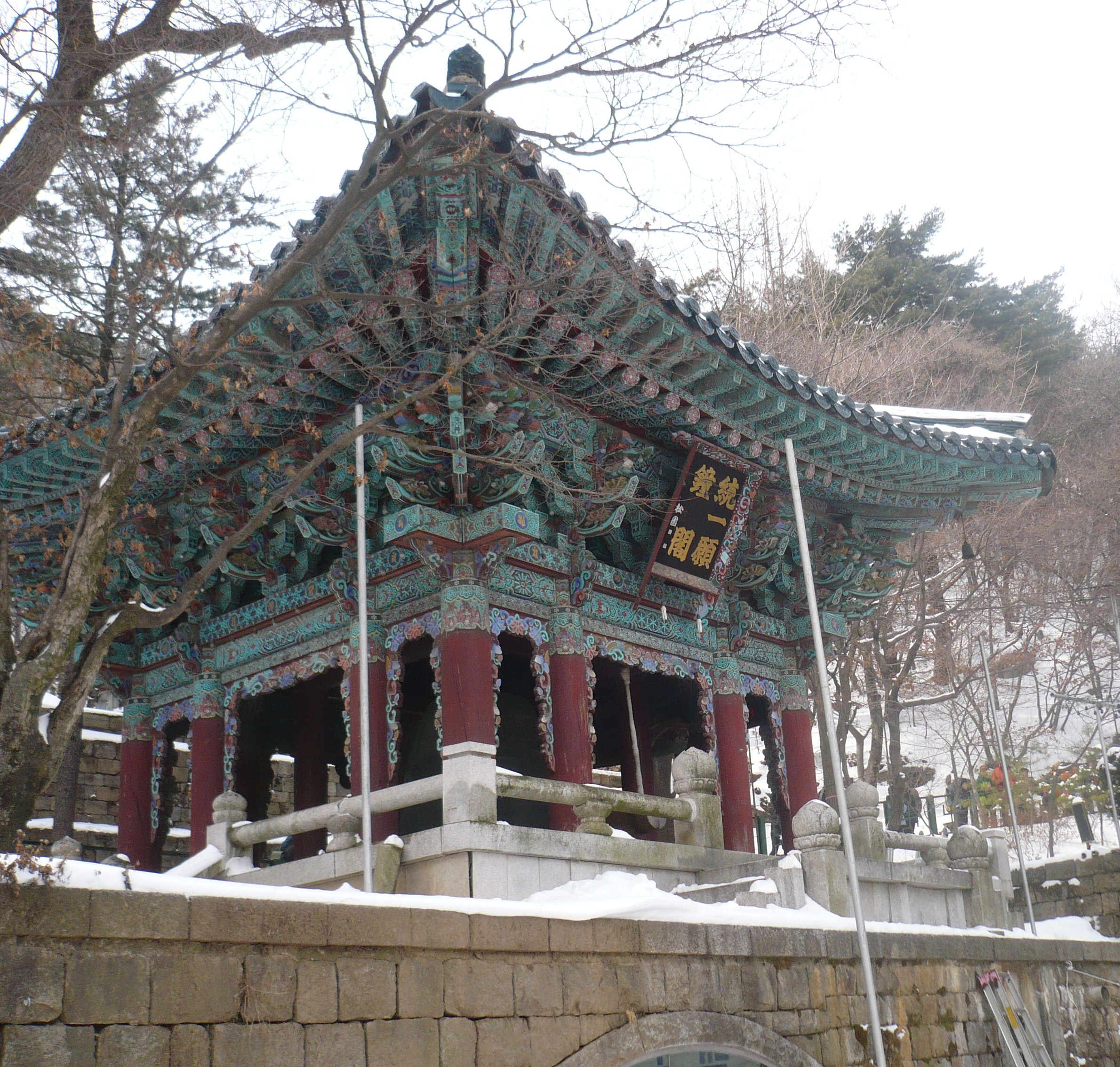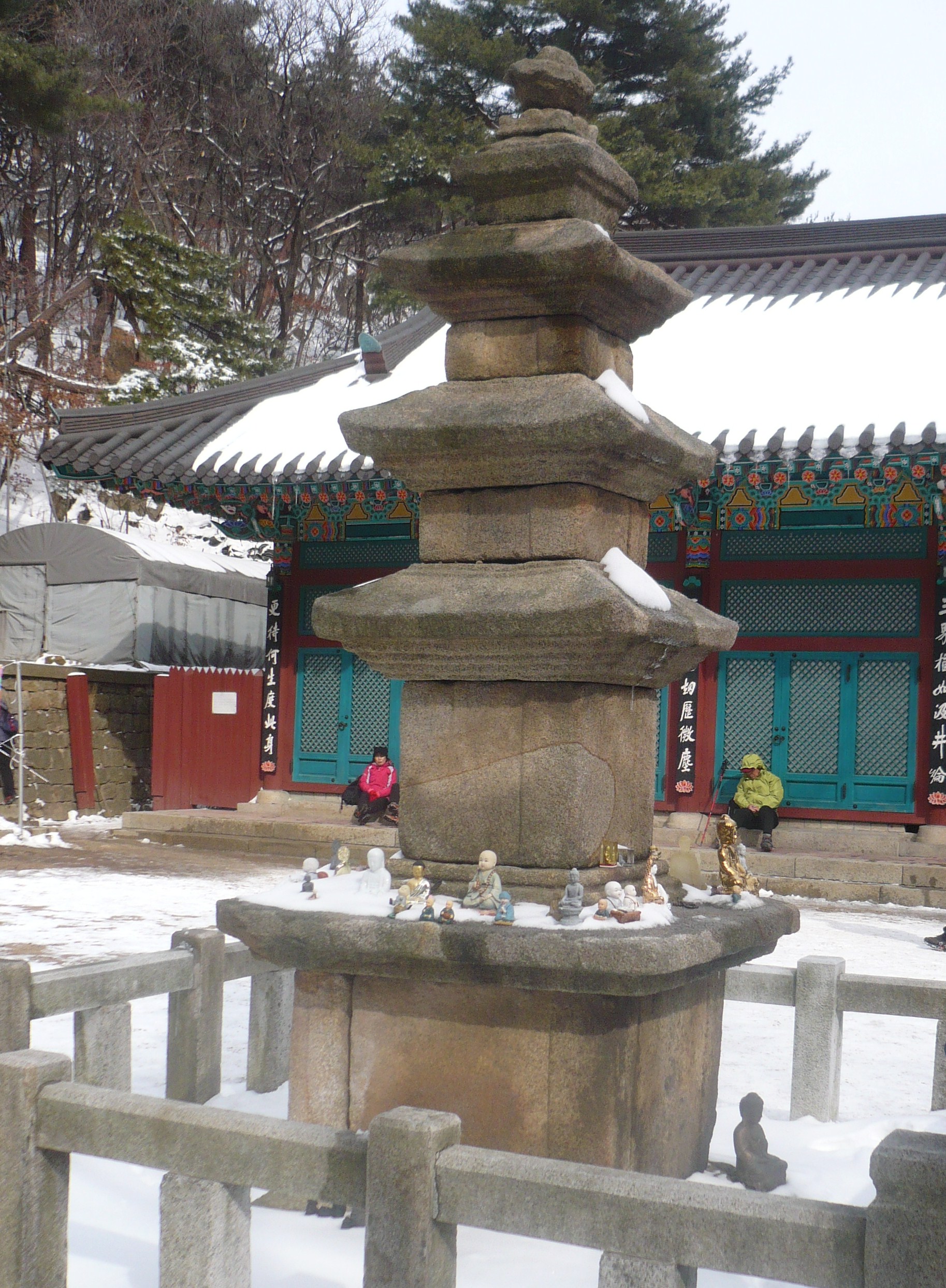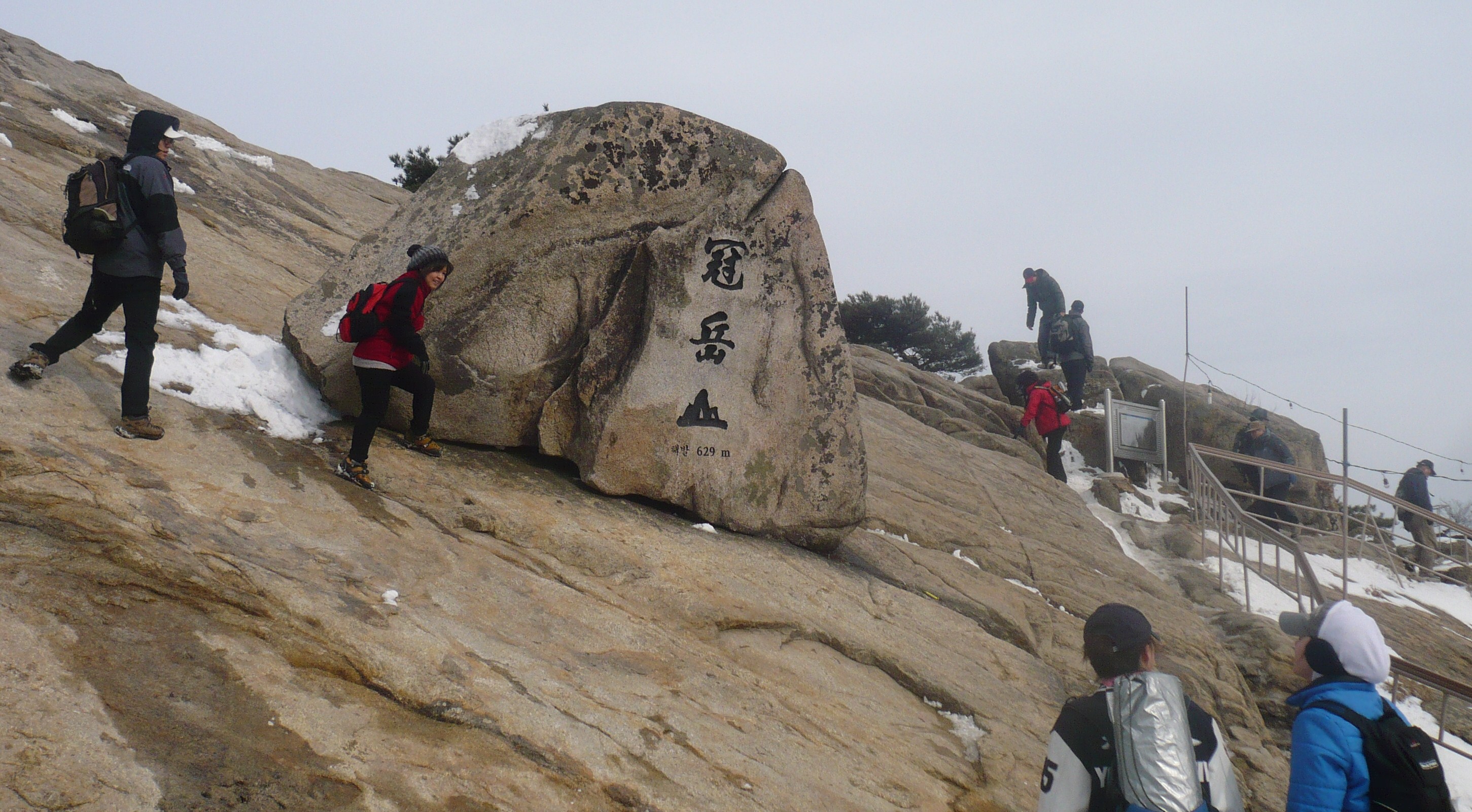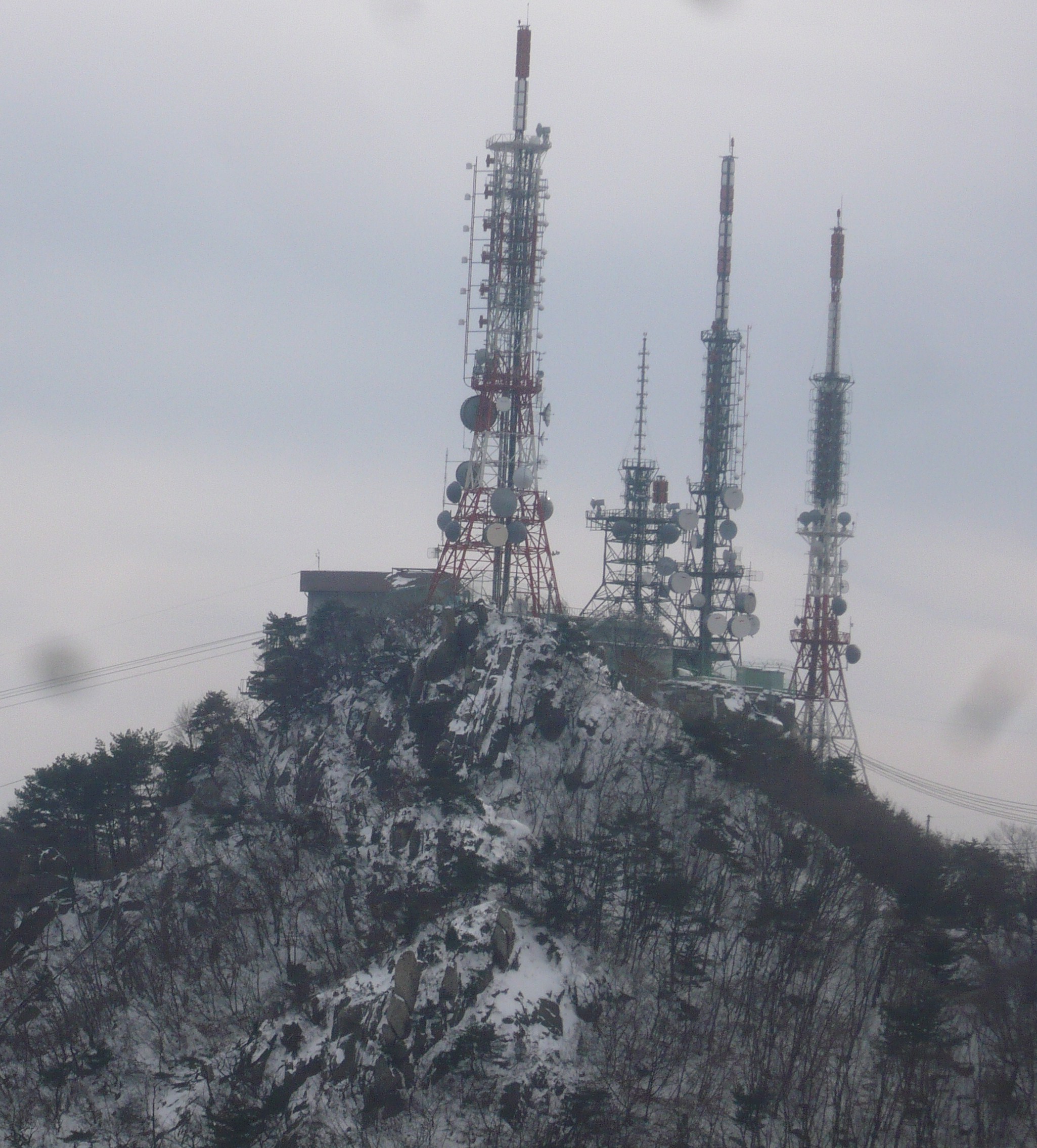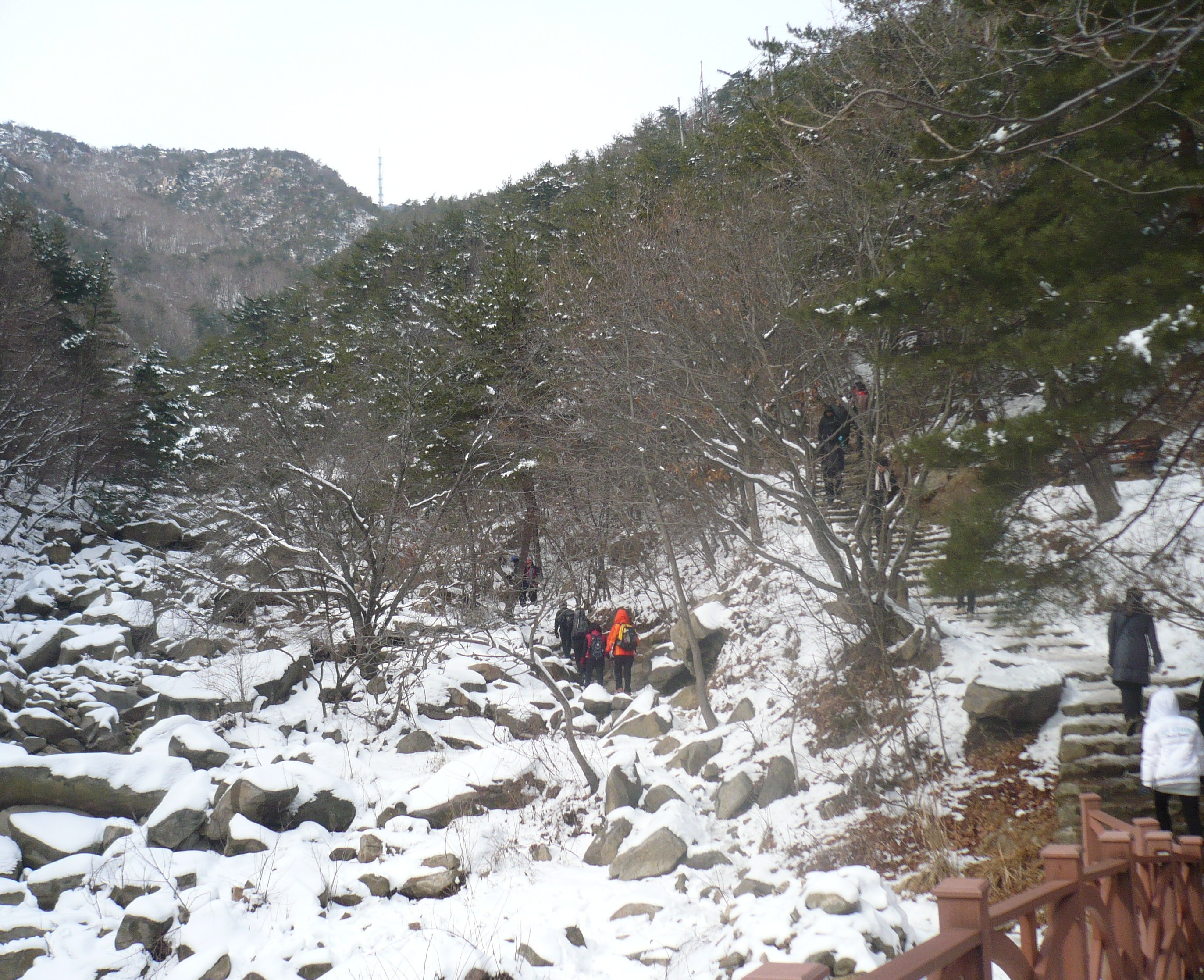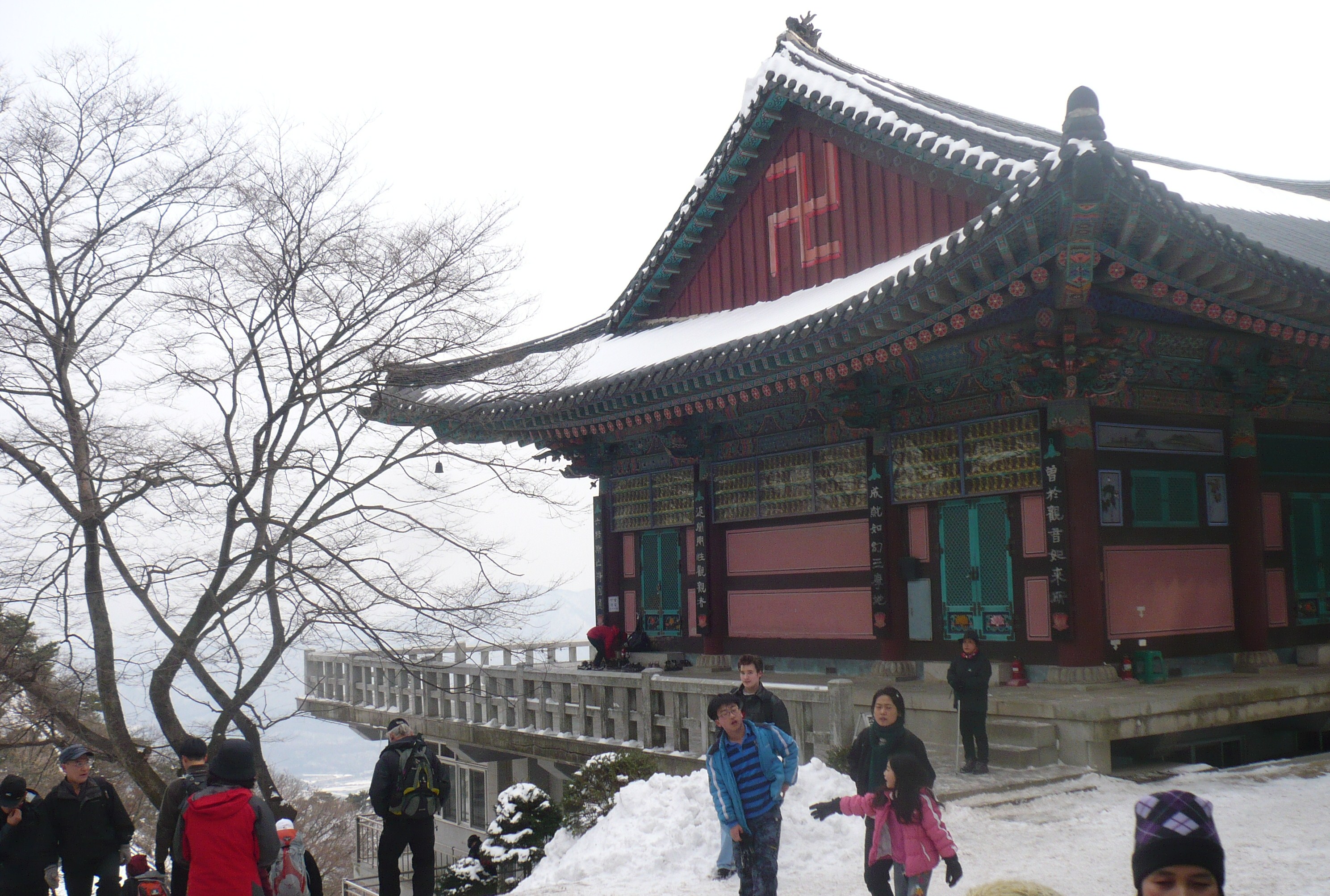많이 배우고 있고 지금 일을 없기 때문에 한국어 학원에서 개속하기로 결정했어요. 수원에서 역원 값이 싸서 저기에서 개속 살겠어요. 가끔 기분이 실망하지만 개속 노력하야 해요.
Category: 한국말을 배움 (Failing to Learn Korean)
Caveat: Gazes of Incomprehension
I'm just feeling very frustrated about my progress with Korean. I feel like no matter what I do, I can't seem to remember essential vocabulary. And I say the same things, over and over, to clerks in convenience stores or to the manager at the guesthouse, and I'm never understood.
Gazes of incomprehension.
And people say things I should understand, and I just stare, with the thought, I should be understanding this, but I can't. I dream in Korean, sometimes, but it's always that specific type of Korean that I can't understand at all… it's just dreaming in confusing babble. So dreaming in a language isn't a guarantee of progress, after all.
At moments like this, my resolve to stay and try to learn this language wavers dangerously, and I think, oh, hell, I'll just go back to the US and do something else. I feel intimidated by the job search, depressed by my lack of progress in the language, unimpressed with my lack of diligence in the tasks that I set for myself. I'm feeling too old, insufficiently competent.
OK… so here I am, venting my despondency in this very open forum. Maybe, it's just springtime blues? Well… "아자아자!"
Caveat: 잠잤어요 (heterosyntactic reduplication)
Korean has lots of “normal” phonological reduplication, which is a common linguistic phenomenon in many languages, notably in micronesian and polynesian groups, for example. Opening my dictionary at random, I can locate words such as: 붉다 (bulk-da, “red”) => 붉다붉다 (bulk-da-bulk-da, “very deep red”). This is a “classic” sort of linguistic reduplication, as might be taught in Linguistics 101.
But recently, in my Korean class, I was introduced to a strange sort of reduplicative process that crosses syntactic boundaries. I tried to invent a term for it, and came up with “semantic reduplication,” but that seems to be already taken for a slightly different process. So I’m not sure what to call it – maybe something like heterosyntactic reduplication? The idea being that the word element is repeated, but under different semantic categories (in this Korean case, a verb stem gets repeated, first in a derived gerund form and then in the basic verb form). Maybe someone’s already named it, but I was unable to find anything on a cursory search.
Here are some examples, that were given in class (accusative particle -을 in parenthesis is optional).
잠(을) 자다 (jam-eul ja-da, “to sleep a sleeping”)
춤(을) 추다 (chum-eul chu-da, “to dance a dancing”)
꿈(을) 꾸다 (kkum-eul kku-da, “to dream a dreaming”)
I have no idea how “productive” this type of reduplication is, but I know that at least for those verbs with which it used, it is common – not a day after my class where I was introduced to this concept, my friend sent me a text message where he used it, in the phrase “잠잤어요” (jamjasseoyo, “[you] slept a sleeping”).
In any event, I think it’s rather interesting, linguistically. Someone could write a dissertation on it.
Caveat: 메롱
I always like learning “non-dictionary Korean” when I can. The above took me a while to find the meaning for, but finally I found some forum postings that aluded to its meaning: roughly, it means “nyah-nyah” – like teasing someone. So that’s what 메롱 (meh-rong) means.
Caveat: The Magical Syntax of the Korean Language
I have found a really excellent example of one of the things I find so amazing and fabulous about the Korean Language. I’ve been watching a TV drama called “커피프린스 1호점” (from 2009), and there’s a scene where the characters are eating together while playing intensely with language as they try top each other’s insults.
They make each other’s names into verbs, they make them into adjectives, they make them into adverbs. Korean syntax is extremely flexible in its ability to make new vocabulary, and also in its ability to change any given part of speech into another part of speech through the use of endings and particles of various kinds. It’s highly systematic, driven by complex rules, yet it’s also mind-bogglingly creative. Really, it’s exactly my kind of thing. Korean rocks!
Here is a youtube clip of the scene that I like so much. Ignore the romantic song at the start, and focus on the scene from minute ~2:30 up to about minute ~3:30, and watch the characters as they talk to each other. The subtitling only weakly begins to capture the amazing things that are done first to Eun-chan’s name, and then to Han-kyul’s.
[UPDATE: the video was removed from youtube, and since I was stupid and didn’t record the Episode number, it’s nearly impossible for me to relocate this clip. Regrettable.]
Caveat: 연주대
Caveat: Plateaux
Learning a language has lots of little plateaux of ability. I was feeling good yesterday, as I was feeling that I was finally climbing off the one I'd been feeling stuck on since starting my class. Small things: being able to simply repeat, with comprehension, some little bits of a short dialog we working on in class.
But then after the class I went into a cafe to sit and study and tried to order, and I thought I was doing fine, but the guy behind the counter looked at me with incomprehension. The thing is, it wasn't even hard, weird stuff to order: it was pure "konglish" – a coffee and scone are simply keopi-hago seukon…. Oh well.
Caveat: 어제
어제 5시반에 일어났습니다. 일기를 썼습니다. 일기를 쓴 후에 또 블로그를 했습니다. 6시반에 샤워한 후에 아침을 먹었습니다. 강님에서 7시에 버스를 탔습니다. 도착한 후에 카페에 갔습니다. 8시반부터 9시40분까지 한국말을 공부했습니다. 9시50분에 한국어 학원에 갔습니다. 한국어 수업에서 학생 다섯명 있습니다: 중국 한명, 태국 한명, 필리핀 한명, 캐나다 한명 하고 미국 한명 있습니다. 어제 12시에 우리 같이 점심을 먹으러 멕시코 식당에 갔습니다. 1시부터 1시30분까지 교보문고에서 지냈습니다. 1시반부터 버스로 수원에서 돌라왔습니다.
Caveat: Full-time Student
Well, my class doesn't start until Monday, but I've been contemplating what I'm attempting. I've been worrying about my ability to really, truly, single-mindedly pursue this. I always approach things so dilettanteishly, in life. In fact, I've made a bit of a positive personal philosophy out of being a dilettante in many fields rather than an expert in any one subject.
All of which is to say, I'm actually feeling a bit terrified at the prospect of trying to be a full-time student, with virtually nothing else on my agenda, and no excuses not to study. Even if it's only a one-month commitment. Well. We shall see.
I just barely placed out of the absolute beginning level on the placement test at the hagwon I'll be attending. I would have been slightly mortified if I'd actually ended up in absolute beginning Korean 101. As it is, I'm in something roughly equivalent to 102.
The problem, as I suspected, was entirely due to my weak vocabulary. There was a section where I had to fill in noun case-endings, for example. I know, quite well, my Korean case-endings. But getting the right ones is next-to-impossible if you don't what the verbs are in the sentences in question. So… not such a good score, there. I actually did better on the spoken section, where the woman asked me questions and I had to answer. But she said I was too informal, and my tenses were wrong.
I have decided that between now and next Monday, I'll try to work through the first half of the textbook, which is the Korean 101 that I just barely placed out of.
Caveat: 내 한국어 능력을 향상하고 싶어요
Today I will make the commitment: I will take a placement test and pay for my one-month full-time Korean Language class. Based on grammar and passive understanding abilities, I’d be sure to place out of the beginning level, but my active vocabulary is so poor, I may get stuck in one of the beginning levels anyway. I’ve been trying to cram vocabulary a little bit, but, as usual, to little real effect.
Caveat: 엉덩이에 사과한다
Oh dear, oh dear. Sometimes, I can understand just enough Korean to create hilarity and confusion in my brain.
I was riding the subway, and in a sign above my head, right in front of me, I read “엉덩이에 사과한다.” Now, as best I can figure out, this means “Apologize to your ass.” Really. Here is a picture of an ad (found via naver image search) that roughly resembles the one I saw.

It’s advertising a product called “apple hip”. There’s a lot going on here, perhaps more than anyone should want to know.
First of all, it’s important to realize that the Korean “엉덩이” can mean all kinds of things, from the innocuous “hip” to the dirty-sounding “ass” – the same word is used for all of these things. I’ve had humorous moments in the classroom, when a student, after a short session with their little electronic dictionary, will innocently and confidently use the word “ass” where we would use the word “hips.”
Secondly, there is a common pun involving the word “사과” which means both “apology” and “apple”. So they work in the name of their product and make a joke about how you need this product to improve your butt. It is also drawing on the huge popularity of Apple Corp. products (and note the Applesque design look, below), making an English-language pun on the word “hip,” drawing on the Korean meaning of “butt” and the English meaning of “cool”. Which is to say, you need this product if you want to be “hip,” or cool, butt-wise.
Now, I could get this far, but I still had no idea what the hell the actual “apple hip” product is. Obviously, something to improve your butt, in some way. One of an apparently infinite line of Korean “beauty” products of dubious intent and claim. Some more research… The best I can figure out, it’s some kind of butt massager. Here is another picture I found on naver:

Seriously! I would expect to see this advertised in my email spam box, not on the subway. But hey (butt, hey?), this is Korea. Strange country.
![]()
Caveat: The Job Situation
A number of people have messaged me or sent emails: "Jared, what's the job situation?"
So, here's a summary, so I don't have to tell everyone: I didn't get the job I was hoping to get, but I knew it wasn't a "done deal" when I came here, so I had contingency plans.
Plan B is that I'm now looking for a job in Korea. But, I'm not in a hurry. Most (or very many) jobs start in March, since that's when the new school year starts for Korean kids. And I'm prefectly OK with waiting until then. I will take my time looking, and be picky about what I can find, at least for now. If March gets close and still nothing, I'll get less picky. I've actually already rejected one offer – it looked way too much like another LBridge in terms of excessive hours and unnecessary staff-room rules.
What I'm doing, instead, is trying to work on the Korean thing. I'm really bad at learning languages – I know all of you think, "oh, Jared, he's studied linguistics, he's studied all these languages, he's so good at it." Well, just to be clear… that last concept doesn't necessarily follow, logically, from the previous ones. So, it's a struggle. I look up the same word dozens of times in my dictionary. It goes on my flash cards. And still, I hear it and wonder, "now, what the hell did that mean, again?" Just yesterday I heard 모든 and thought, "I looked that up about 30 minutes ago. What did it mean?" I recognize that I should know a word, but not always know what it means.
Anyway, because of that, and because of my "Motivational Deficit Disorder" that I sometimes struggle with, starting around Feb. 1st I'm enrolling in a full-time "Korean Language Hagwon for Foreigners." I think it will help structure my time, and give me opportunities to practice Korean with Koreans who will be patient and scrupulous with me, because they're being paid to be.
So, in fact, because that's a month-long commitment, I don't actually want a job before March 1st, at this point. And that's fine. It will give me time, hopefully, to find something that works well for me. I'm looking at "after school at public school"-type positions, right now. They're the latest thing, where, essentially, public schools are elbowing in on the traditional private hagwon market by offering their own higher-level supplemental coursework in the afternoons.
Caveat: Rosetta
One thing I did before leaving the US, is that I broke down and spent a rather large sum of money on Rosetta Stone language learning software, for Korean. I had a couple of reasons.
Firstly, of course, there is my desperation to somehow get better with Korean, and therefore a willingness to try new and different things, and spend money doing them.
Secondly, however, was that as linguist, I've been wondering what, exactly, they were doing that allowed them to believe themselves a premium seller of language-learning tools, for that's the way they market themselves. Are they really that good? I wonder. There is so much in the way of really bad materials for language learning, devoid of any apparent familiarity with linguistic theory, often replete with errors and folk-judgements about things like sound change or grammaticality.
I've managed to work through the first 3 lessons of the first unit of my Rosetta Software Korean Level 1. Here are my thoughts.
As software, it's extremely well designed. Attractive, easy to figure out, intuitive, just as they claim. My primary complaint with the interface is the speech-recognition tool… I got lots of answers "wrong" as I worked through it because it simply doesn't seem to "hear" me. And it seems a little bit buggy in the way it handles not being able to "hear" you, leaping along and going "bing," "bing," (error, error) without giving you time to try again. Also, A few times, I became frustrated with a new type of exercise and the lack of instructions on how to do it, but ultimately I recognize that this is part of the "method" being used: they want the user to solve each exercise, each section, as a little puzzle, and be engaged at a more-than-analytical level in using the language.
As far as awareness of linguistic theory, I'm less impressed. They make the same sorts of grammaticality judgements as so many horrible "beginning Korean" texts, and I'm not sure the focus on the highly stilted, fully inflected forms of the nouns is going to lead me to any kind of communicative efficacy, down the road. Actual Koreans speaking actual Korean almost never use the kinds of singular-plural inflections they're teaching here, at least in my experience, for example. I'll try to keep an open mind.
The single most frustrating thing is the speaking exercises. Not just because of the wonky speech-recognition problems I described above, but because they give you little hangeul prompts for words to pronounce, but they aren't really useful at all — because they're not explaining or displaying or in anyway accommodating the extensive and overwhelming processes of sound change and syllable liaison that operate within Korean words and phrases. I can figure out what they want me to do, because I have a degree in linguistcs and several years of effort behind me in sounding out Korean hangeul, but I think that if I was a typical, linguistically naive language learner, my simple, heartfelt reaction would be: WTF!
I'm sure they have a couple lessons in the introductory part, where they're teaching you hangeul (which I didn't work through) — but honestly, exposure to the sound change and liaison rules is not the same as internalizing them — the software needs to hammer these rules home in these speaking exercises. I've seen plenty of beginning Korean texts that will provide two "spellings" for each word: a standard spelling and then a "sounded out" spelling that explicitly reflects the sound change and liaison rules in operation. If the software did this in its presentation of speaking exercises, I think it would be a lot more transparent. As it is, you hear a pronunciation and read the hanguel on the screen and wonder if the person narrating is looking at the same thing you are.
Lastly, I really think I'd have struggled immensely with making heads or tails of this software, if I hadn't brought with me the extensive background and previous effort in trying to learn the language. I've already been exposed to much of the vocabulary, and all of the grammatical concepts being covered, on and off over the last couple of years, and most importantly, I'm comfortable with the Korean writing system and can recognize syllables at a glance. And with all that, I'm getting only 85% correct on most of these units. How frustrated would I be if I was coming at it "cold"? I'd be giving up, is my guess, and muttering "impossible!"
So, that's my review based on about 6 hours of hard work with Rosetta. I'll stick with it, if only because for me, it's very helpful with vocabulary. But was it worth 400 bucks? A tentative NO.
Caveat: Watching My Karma Unwind Around Me
I don't actually believe in Karma. Not as Buddhist dogma would have it, with reincarnation and sankharas (sp?) and all that. I believe we each carry a sort of karma within the frame of our own lifespan, as we make decisions, and those have consequences, and things we do to or for others are repaid in part or in full or passed along. Creative expression is a means of extending the reach of one's own personal karma, in this respect.
I seem to have a tendency, in my life, to seek out and find myself in situations where I've deliberately created too many options for myself. So many options, that it's very hard to make a move — I sit in a sort flux of indecision, like standing hip-deep in a stream and feeling the current tug at you.
So there I am. I'm working on the job search. But that's a slow, evolving process that requires a good deal of patience. I'm working on studying Korean, but that's an even slower, evolving process that requires more patience than the Buddha himself has. The Buddha may have lost his equanimity, had he decided to try to learn Korean. Heh.
I have a lot of "free" time, and I'm not spending it well.
Caveat: “입을 다스리는 글”
“입을 다스리는 글” is a title to a proverb (or prayer) that was on a piece of cloth that I gave as a gift to my friends Juli and Keith in Oregon.
I have been feeling somewhat embarrassed because I had not conveyed to them very accurately the true meaning of the saying. Here is an updated and hopefully correct translation for all the world to see (and thanks to my friend Jinhee for her help translating). My friends Juli and Keith may not want to have it on their wall given the new meaning, or they may decide they like it. I spent some time thinking deeply about it today, and decided I like it, after all.
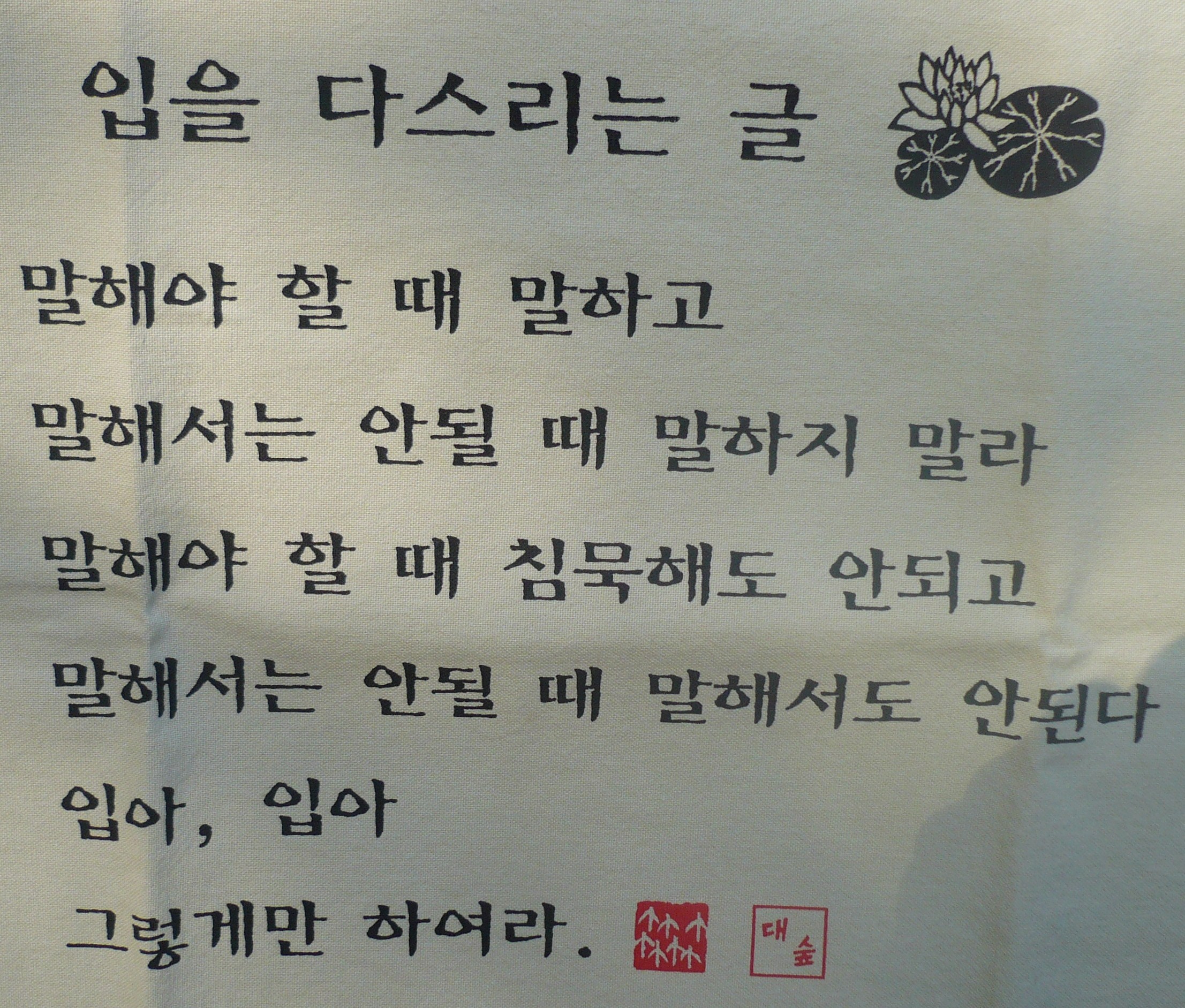
입을 다스리는 글
말해야 할 때 말하고 말해서는 안될 때 말하지 말라 말해야 할 때 참묵해도 안되고 말해서는 안될 말해서도 안되고 입아, 입아 그렇게만 하여라
A note on controlling one’s tongue.
One should speak when necessary, and not speak when one should not. One shouldn’t stay silent when one should be speaking, and one should not speak what one should not say. O tongue, my tongue, I pray you do just that.
I think silence is very important. That’s my vaguely quaker upbringing, shining through, perhaps.
We went hiking this morning up into a “slot canyon” in the eastern part of Zion National Park this morning. There were six of us, walking and tromping and scrambling and climbing and tossing rocks into pools to make fording them possible, and talking. Lots of talking. Finally, we were relaxing on the face of rock above the canyon, and Jay wanted to have a prayer. And I butted in and said, how about a Quaker-meeting minute-of-silence. This was approved, and at last, we were seated, gazing at the sky and rock and trees, and it was silent for about 5 or so minutes. It was very beautiful.
So keeping one’s mouth shut can be nice. There are definitely times for that.
Here are some pictures from this morning.







[this is a “back-post” written 2009-11-30]
![]()
Caveat: 개구리도 움츠려야 뛴다
개구리도 움츠려야 뛴다 => frog-also crouch-[“only when”] jump-[UNMARKED PRES.] => “A frog has to crouch first to jump.” A Korean proverb that I found inscribed on a tourist-souvenir tshirt that I bought before leaving Korea.
I ran errands today. It was blustery with cobalt clouds scudding across the sky. Intermittent splutters of rain, 12 C. Weather like this could convince me I’d rather stay in Minnesota than return to Korea or elsewhere — I love Minnesota’s weather so much. People think that’s crazy, but it’s really, truly true.
I had dinner with my stepson Jeffrey, who’s moving from St Cloud to Twin Cities because of a promotion with his work. I enjoyed my time with him — he’s turned out a strong, decent sort of human being, and I’m glad.
Caveat: 안녕히 계세요.
이년동안 한국 이산에서 많이 배웠고 재미있었어요! 오늘 미국에 여행하고 있어요.
Caveat: 돈키호테. 진짜?! 왜요?
I keep telling myself that if my Korean is going to improve, I need to try harder to read things. I frequently puzzle my way through parts of newspaper headlines or articles, and I’ve learned a lot reading advertisements, but such forms of “found Korean” won’t be available to me when I return to the US. So I’ve been telling myself I should buy some actual books in Korean to try reading. It is perhaps too ambitious, given the pathetic level of my vocabulary — but I’m pretty good at working out the grammar as long as I have a dictionary in hand.
In one final visit to the bookstore today, I bought what looks to be a late-elementary or middle-school level text of Korean history, that I might try. I also found an abridged translation of Don Quijote (돈키호테 = don-ki-ho-te). I remember when I was first trying to learn Spanish, I would sit down and try to read, in Spanish, books I had read before in English. So what better first text to sit down with in Korean than a translation of something I know very well in Spanish?
Caveat: Traveling Alone
Last night felt like a disaster.
I was already feeling moody and gloomy after my ferry ride back to Korea. Riding the ferry wasn't like a boat ride (which I love). Because it was a high-speed hydrofoil (I've only ever ridden a ferry like that a few times before), you can't go out on the decks, you basically sit strapped in your seat for 3 hours. I should have signed up for the 10 hour regular ferry, maybe. Riding the ferry was like sitting in a taxying airplane for 3 hours. And while on the ferry, they showed a really depressing tear-jerker movie about some little boys with cancer. It was a Korean movie, with Japanese dubbing, but it was pretty easy to follow the plot. Lots of emotional, teary moments. I actually get pretty strongly affected by such things, I think.
So I was moody. And I was returning to Korea, which was a bit like coming "home" but not really. Partly because I'm always going to be an alien in Korea, no matter how long I spend here. But also because I'm only going to be traveling around a bit, and then really leaving to return to the US. So I was feeling melancholic because it was a bit like it was going to be a goodbye tour.
The hotel I found and checked into seemed alright, at first. But it was really unpleasant. I should have run the other way when I found a complimentary can of RAID in the closet. And there was a neon sign outside the window. And the air conditioner didn't work. Etc., etc. I'm too stubborn (or stingy?) to just write off the money spent on lodging and find something better, and I'm too shy, especially with my disappointing language skills, to argue about things or complain about things to the management. Being a loud, complaining customer is really hard for me.
I got fixated on having some bibimbap for dinner (since I'd come back to Korea). So I found a place that sold bibimbap and ordered some for take out (포장해 주세요…). They clearly understood what I wanted, but apparently weren't the sort of place accostomed to giving take-out. They tried to insist that I stay and eat, but… I was feeling melancholy, as I said, and was really fixated on just taking it back to my room and eating in my private gloom. I was remembering many meals of take-out that I would get from the place near my apartment and take back to eat alone. I really don't like eating in restaurants alone (except maybe fast food joints), I always feel uncomfortable. That's why when traveling alone like I am, I tend to eat a lot of take-out and carry-out type things (although still trying to avoid too much fast food — at least American-style fast food).
So anyway, the woman at the restaurant was actually having a conversation with me. And at one level, I was surprised, because she was attempting to do it in Korean, and I was attempting to answer in Korean, and it was going back and forth, although with some (a lot of) confusion. Why was this surprising? Because this almost never happens. It's one reason learning Korean is so difficult: Koreans don't like to try to talk Korean with foreigners. They must think it's impolite, or frustrating, or … who knows what. It had already happened to me more than 5 times just in the short time between disembarking from my ferry and getting to this restaurant: I attempt to start some kind of exchange in Korean, and I get this bewildered, puzzled look in response, as the look up and realize I'm a foreigner, and they either couldn't understand what I'd said, or that they could but it wasn't the expected English (which they often can't understand either, but at least they understand why they can't understand).
It's so different from Japan. The Japanese always talk to you in Japanese. Even after they see that you're a foreigner. They only ever switch to English if you explicitly ask them to, or persist with several answers in a row in English. Because of this, while in Japan I had more "conversations" (such as they were) in Japanese over 10 days than I could've had in Korea over several months. That was another depressing thing about Korea, coming back from Japan. How can I ever learn Korean when Koreans refuse to speak Korean with me? Perhaps the contrasting Japanese behavior displays a sort of underlying cultural arrogance (it's a bit like the French are reputed to be, right?), but from a language-learner perspective, it makes things so much easier.
Here I was, then, having this "real" conversation in Korean with a Korean restaurant lady, and she's badgering me to eat in her restaurant, and I'm being stubborn because I have this fixed idea that I wanted to eat my bibimbap alone in my crummy hotel room. So she starts chatting about other things as the kitchen staff prepares my take-out. I'm American, yes. I was in Japan, and came back. And wow, most of it is in Korean. I'm feeling mildly please. Then she says, hey, you've got a bit of a paunch. Pointing at my gut.
Now… this is typically Korean, too. This business of openly and flatly commenting on the physical characteristics of strangers. Not always positively, either. "Gee, teacher, you have a lot of gray hair," is something I've heard more times than I can count. And not just students… strangers on the subway, or whatever. I know and understand that for Koreans, it's a way to make conversation – once you get past the awkward first steps (the must-knows: age, place of origin), all topics are open game. It's not meant to be offensive, although I suppose even Koreans would agree it's kind of "low-brow" to make random, negative observations about the physical characteristics of just-met strangers.
So I grinned and agreed. Too much bibimbap, I tried to say. I don't think I said that right. She seemed annoyed I'd returned to the topic of the food (which was a lost battle, for her). And then my food was ready, and I said thank you very much and took it back to my hotel room. They had their revenge, however — there was neither spoon nor chopsticks in the take-out bag (although it was quite delicious and was exactly what I'd been craving). Nevertheless, I ate it guiltily. Because of the paunch.
I've always felt like I could stand to lose a bit more weight, and that just hammered it home. I watch my quantity of food intake pretty carefully, normally, and I walk everwhere. Living in Ilsan, I even fell into and out of and into and out of the habit of going jogging. At my best, I'd go 3-4 times a week, other times, I'd miss a few weeks.
But I've maintained my weight pretty well since losing all that weight back in 2006-7. Still, I could stand to lose more, right? And, I've got a bit of a paunch. Probably, traveling around, despite the huge amount of walking everywhere, I've gained a bit, because I don't have the same kind of discipline for intake: I see something delicious in my touristic meanderings, and I buy it and eat it.
So that made me depressed, as I lurked in my stuffy, mildew-smelling hotel room and tried to go to sleep. I was feeling all kinds of remorse: for deciding to leave Korea (although that's reversible); for failing to learn Korean (this is my hugest bugaboo, probably, given it was always one of the main "reasons" for coming here in the first place); for failing to watch my weight; for not just giving in to the restaurant lady and eating in her restaurant, like she wanted; for trying, yet again, to travel alone, even knowing that rarely works out well for me.
And why is it, anyway, that I travel alone? Well, because that's who there is to travel with. Michelle and I had many things we used to fight about. But we were amazingly compatible, when traveling together. Those were the wonderful times. We never fought about things related to traveling: if we fought while traveling, it was about other things (like that unforgettable knock-down-drag-out argument about Aristotle vs Plato on the drive back from Winnipeg to Minneapolis, one time). We had the same way of traveling: no plan, just go out and look and explore. I miss traveling with Michelle very much. And now, like most of my life, I travel alone. Because traveling is too important to me, and too much fun for me, not to do it; but traveling alone sometimes really depresses me, too.
Caveat: “The Bullet Train from Tokyo”
This is the other video I made where I started with the song and added the video bits I'd recently taken. The lyrics to the song ("Hammering in my Head" from Garbage's 1998 Version 2.0 album) include the phrase "the bullet train from Tokyo" and I'd always imagined, someday, I would be on a bullet train from Tokyo, and lo, last Saturday, I was. So I made this little video, and, fortunately, this time, youtube allowed my "third party copyrighted content" — so you all can see it.
It's funny, because youtube communicates with me in Korean (not always very successfully, I might add, but I can get the gist). I can't figure out how to change the setting that makes it do this. Here's what it told me about this posting:
caveatdumptruck님,
회원님의 동영상 "The Bullet Train from Tokyo"에 UMG님이 소유하거나 라이센스 권한을 갖고 있는 콘텐츠가 있을 수 있습니다.
별도의 조치를 취할 필요는 없습니다. 그러나 회원님의 동영상에 미치는 영향에 대해 알고 싶으면 계정의 콘텐츠 ID 일치 섹션을 참조하시기 바랍니다.
Sincerely,
– YouTube 고객지원팀
I like the "caveatdumptruck님" [honored caveatdumptruck]. And the "Sincerely" in English — what's with that? I wonder if it's going through some kind of automatic translation software.
I'm still puzzling about what to do about my other, disabled video. I'm searching for a different song that I like that I can match to it, that youtube might allow… but, since I deleted the raw source footage that I used to make the video (to make room on my hard drive), my options are limited. Ah well. It was no big deal, really.
Caveat: Languages
Yesterday I went to the Meiji Shrine, among other places. It's kind of a big almost wilderness-y park just a few km south of Shinjuku. Quite stunning and beautiful inside. I took some video… maybe I'll try to process and post it, later.
Anyway, when I first got there (after walking the wrong way around to the "back" entrance, as per my obtuse, instinctive, anti-touristic custom), I found myself having a short exchange with the guard at the entrance, since there didn't appear to be any signs with English making clear I was at the right place. Nothing fancy, mind you: Is this the Meiji Shrine? Yes. Thank you.
But I realized that I was managing the exchange in not-too-bad low-level Japanese. The guard definitely seemed impressed. That's a tribute to my 20-years-ago Japanese teachers at the University of Minnesota, I suppose. Still, I immediately felt very frustrated and almost angry: the "trying-to-learn-Korean-for-over-2-years Jared" suddenly was very jealous and resentful and pissed off at the "haven't-even-looked-at-Japanese-in-20-years Jared," because that was an exchange that would have still given me anxiety in Korean (although I think I might have managed it).
I can meditate on various reasons and excuses why I find Korean so difficult. There's the mind-bogglingly weird sound system (I mean, not in absolute terms, but to us English speakers). There's all those Chinese-origin homonyms (what happens when you borrow 4 words that are identical in pronunciation, except for tone markings, into a non-tone language?). But the reason that's probably most likely, but that's hardest for me to accept, is that apparently there's a big difference between my 20-something brain and my 40-something brain. I've commented on this before. Oh well. Maybe I should just study Japanese, since it seems to come so much more easily to me?
But… I like Korean. Do I like it because it's so hard for me? Am I a linguistic masochist? Hmmm.
Caveat: Each Day…
I've been trying to decide if I will continue my monomaniac effort to post to this diary each and every day, after I cut myself adrift. It will be less convenient to continue doing so — I imagine a search each evening for a PC방 (Korean internet game room) or the local equivalent wherever I am. I've never been good at keeping up habits in the face of inconvenience. One of the favorite creative bits of language I've ever run across in any of my EFL students' writing was Ella's "inconvenience is the mother of invention." So what would I invent? No need, here. I can always "post date" / "pre date" my blog entries. But that kind of feels like cheating. Well, it's of no major consequence, actually.
Yesterday I had a student giving me a long, drawn-out excuse for unfinished homework, involving diarrhea and visits to the doctor, apparently. I would have preferred the abridged version, to be honest. But it did expose me to some unexpected vocabulary in Korean, and thus, as tends to be the case, I made it into a "teaching moment." I don't know it it was appreciated. But whatever.
Not-so-random notes for trying (still trying, only trying) to learn Korean
자신 = self-confidence, confidence -하다 to have self-confidence
할아범 = old man (according to dictionary)
할아범탱이 = not in dictionary, my students tell me it means senile old man
전염 = infection
변비 = constipation
설사 = diarrhea
모든 = each, every, all, whole
Caveat: Cost of living
On average, I live very cheaply. I probably average less than 20,000 won a day in expenses, including: food, electricity, DSL, cellphone, transportation, and my magazine and book habit. That's around $16 at the current exchange rate, or less than $500 a month. I have no rent (that's covered by my contract). Of course, I have another set of expenses – about $350 a month support my US-side dormancy: storage unit, vehicle-in-storage, private mailbox. Those costs make sense in the view that living abroad is strictly "temporary" but I'm beginning to question that. But even including those costs, my overall "cost of living" is well under $1000 per month. Of course, by most people's standards, I have a stunningly boring life.
What's interesting to me is that although my income is about 20% of what it was during its peak years 2004-2006, I'm nevertheless saving at a higher rate of net savings in absolute terms! And I'm happier, besides. So, at least in my case, money does not buy happiness, nor does it even buy security.
These reflections on my cost of living were brought to the fore of my awareness because I had one of those rare "extreme spending" days: I bought two new pairs of glasses (much needed and much procrastinated), I paid for my tickets and some other reservations for my upcoming touristic trip to Japan, and I bought my last big installment of pre-move-out groceries, including my fix of good Dutch cheese, Spanish olives, several varieties of fresh kimchi (cucumber, white cabbage and radish being this time's selections), and some fresh fruits and veggies (I have some really excellent 국산 apples). So, after months of extreme-cheap living, I spent over $1000 today! It felt weird. Plus, I'm still shopping for a camcorder, and I want to buy some "souvenir" type items to send back to gift to people in the states upon my return.
Vocab Notes for Korean
받은 = received, accepted (regular past participle from verb 받다)
공장 = factory
폭동 = riot
가능하다 = be feasible, be possible
인하다 = be a consequence of, be due to [attached to preceding nominals in -로 (?)]
매미 = cicada, cricket, locust
울다 = weep, sob
매미가 울다 = a cicada sings
면담할듯 = will converse directly (? how does this end up future tense?)
즉석 = instant, improvised
계약종료 = end of contract
경기안내 = game guide (i.e. schedule)
필요하다 = to need, to require
Caveat: 냉콩국수
어제 내 친구를 만났어요. 엘브릿지에서 가까운 영어학원을 소유하고 있어요. 하지만 에전에 링구아포럼영어학원에서 내 상사 였어요. 우리는 이야기도 많이 하고 일산칼국수 식당에서 저녁도 먹고 갔어요. 우리는 냉콩국수도 먹었어요. 맛있었어요. 새로운 영어학원을 열었는데 학원이 절되서 다음해에 내가 근무할 수 있어요. 여하간, 이야기 하는 것을 좋아했어요.
Caveat: ‘오바마스럽다’=’쿨하다’
Headline from a Korean news website, an article about how the word “Obama” becomes a synonym for a certain type of “coolness” in the U.S. The phrase above translates, roughly, “being like Obama = being cool.” Note the Korean verb for “being cool” is /kulhada/ [literally “to do cool“], borrowed directly from English.
Caveat: 바쁜게 좋은 거예요
바쁜게 좋은 거예요 => busily good thing is => “it’s good to be busy.” This is what it seems nearly every Korean says when one complains about being busy. I don’t entirely disagree, either.
I saw my friend and former coworker Basil off at the airport today. He’s returning to the U.S. with intentions of starting grad school in a few weeks. I wish him best of luck, but I’ll miss being able to occasionally hang out with him and BS about various topics.
I’ve been working on mastering the distinction between Korean ㅅ/s/ and ㅆ/ss/, which are phonologically quite distinct but which sound essentially identical to English-trained ears. The /ss/ (revised standard transliteration) is not just a geminate (double) /s/, but rather something quite different… it’s “tense” or “faucalized” featurally, and seems to involve something like a pharyngealization of the subsequent vowel. So far the best pronunciation tip I’ve received is to try to remember holding my teeth together, touching, when making the /ss/, but letting them relax on the /s/. This may be why some transcriptions render ㅆ as /ts/ instead of /ss/. Here’s a horrendous tongue-twister based on trying to practice the distinction: 싸서샀어요 /ssaseosasseoyo/ = (it) was cheap so (I) bought it.
Vocab Notes for Korean
외계인 = a space alien
주요 = main, essential, important
구하다 = search for, look for, demand, desire, buy, purchase
순수하다 = be pure, be genuine, be true
평범하다 = common, featureless, humdrum-looking
아담하다= elegant, graceful
일탈하다 = deviate from, depart from 일탈 deviation
행위 = act, work, conduct, behavior …so… “일탈행위” deviant behavior (?)
장 애자 = a handicapped person; a brain-damaged person (this is very important vocabulary for comprehending the joking around of 5th graders – see picture below for what is apparently an exemlar of a “jangaeja” – probably best not to ask about the plastic pitchfork)

![]()
Caveat: 쓴경험이 있었어요.
My students, especially at the lower level, often write about some bad thing that has happened to them, leading to being reprimanded by parents or teachers, and they will conclude with a sentence that looks rather formulaic: “I had bitter experience.”
That’s not bad English, but it’s not really idiomatic. It’s clear to me that they’re translating some Korean idiom. I’ve been trying to figure out what that idiom is. My best guess has two variations:
1) 쓴경험이 있었어요 = bitter experience (subj) there was
2) 쓴경험을 했어요 = bitter experience (obj) I did
Both seem like good Korean. But I still haven’t gotten clear feedback if either of these is really a common idiomatic phrase. More research required.
Caveat: Vowels are a scarce resource
There are not many jounalistic spaces on the web that I would consider personal "destinations," in the sense that I save bookmarks to them and return to them regularly because I enjoy the content and find it reliably entertaining. This is doubly true for blogs and news sites related to technology. I'm much more likely to simply find myself surfing to locations because of some specific interest being pursued via one of the big aggregators of news and opinion, e.g. Google News or Wikipedia, etc.
One place I have found myself returning to regularly is The Register, a UK-based news and blog site about technology. The writing is reliably high-quality for the most part. And I especially enjoy the dry, sarcastic humor of blogger Ted Dziuba, from whom I borrowed the observation that I used as the title of this blog. It's not really relevant to anything in particular, it's simply funny. It reminds me of the Onion headline from a decade or so ago, that said something along the lines of "Clinton deploys vowels to grateful Bosnia."
Then again, it depends where you are. In Korea, if anything, they suffer more of a vowel surfeit than a shortage. I think the language would be a lot more manageable if they would dispense with a few of their more challenging vowels and diphthongs. Ah well.
Notes for Korean (while trying to use a computer)
검사 = inspection, test, examination
무료치료 = "no charge cure" (in context of antivirus ware.. seemed weird)
취소 = cancel
종료 = end / close
Caveat: Long week
Caveat: 분노폭발
We have this newish thing at work, where we’re having the more advanced students post their typewritten writing assignments online, on a collaboration server that we’ve long used for posting work-related stuff. This is the wave of the future (or rather, of the recent past, really) – things like this are pretty much the standard in business, both in the US and Korea, nowadays. I think the parents appreciate it, since it’s not necessarily something the students at that grade level (4th~6th mostly) are being taught in public schools, nor even at their “math/science” academies, which focus almost exclusively on test prep. It gives them a small taste of how “grownups” need to be able to work with documents, computers, and the internet.
 As can be expected, however, the student-destined collaboration directories fill up with some peculiar junk: weirdly named (and unnamed) documents in a hundred different (“I didn’t even know that was a format”) formats, etc. And today, in my Eldorado 2 class’ directory, I found a JPG picture of an enraged cartoon baby, with the quote “분노폭발” (see picture).
As can be expected, however, the student-destined collaboration directories fill up with some peculiar junk: weirdly named (and unnamed) documents in a hundred different (“I didn’t even know that was a format”) formats, etc. And today, in my Eldorado 2 class’ directory, I found a JPG picture of an enraged cartoon baby, with the quote “분노폭발” (see picture).
Is a student expressing frustration? I have no idea who put it there – someone in that class, presumeably. Or just sharing something they thought funny? Or not having intended sharing it at all, maybe?
Anyway.
Caveat: Beat the keyboard
"The piano is easy to play. Beat the keyboard." – Shaina, 5th grade. And here, all this time, I thought it was difficult. That it required some kind of finesse. Maybe I should give it a try.
I found a phrase that just drove me nuts:
우리학원을 오시려면 이렇게 오세요
The breakdown, as far as I can figure out:
우리학원을 =our school+[OBJ]
오시려면 = come+[HONORIFIC]+["INTENTIVE-SUPPOSITIONAL"(whatver that is)]+[CONDITIONAL-CLAUSE-SUBORDINATOR]
이렇게 = being thus+[-LY] ("thusly")
오세요 = come+[HONORIFIC CONJUGATED]+[POLITE/FINITE]
So, from all that:
if your honorable self might come to our school, come like this [i.e. here are some directions for getting here? or, i.e. come "as you are"?]
Meanwhile, babelfish alleged:
"Our school five cotton come coldly like this"
Hahaha. Never trust babelfish. That looks like it should be on a tshirt, though.
Other Korean Vocab:
회원 = member
금상=gold (first) prize
Caveat: Frustrated
I have been feeling increasingly annoyed and frustrated with myself. I've been in Korea for 20 months. I was here a year, before that, in 1991. I still haven't learned but the barest modicum of Korean language.
I spent 16 months in Mexico, when I was twenty, and bootstrapped myself into near-fluency. I'm willing to acknowledge all the differences: difference in age, difference in personal attitude and outlook, difference in the "luck" of my work situation and friendships (in Mexico) or lack thereof (in Korea). But it still angers me that I can't seem to make anything even close to the same progress with this language.
I'm a fundamentally shy person. That doesn't help. I'm 20 years older, which is a handicap for both reason of brain chemistry as well as for reasons of culture: Korea's ageism is profound and pervasive, and it seems to make building friendships even harder than they would otherwise be for me.
I'm really sad and depressed about learning Korean, right now. I often make excuses, but it is, at core, the main reason I came here. So what gives? Why can't I? I blame my laziness. I feel guilty whenever I don't study, or when linguistic anxiety prevents me from taking on a challenging situation. I feel guilty constantly, about it. And feeling guilty doesn't help, either.
I have a student who, in the bottom left of her paper, almost always writes: "If you smile, you will be happy." I assume this is a sort of motto or pep-talk to herself. But I need to do something with it, too. Still… that doesn't make learning Korean any easier, either.
Caveat: 힘들어 죽겠어요
This seems a kind of common idiom: I will die from ___ = ____ 죽겠어요. Above, it says I will die from being tired. But you can be about to die from many things: being too busy, boredom, etc. Basically, it just means a lot. We have similar idioms in English: “This shit is killing me.”

